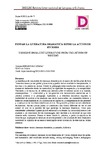Mostrar o rexistro simple do ítem
Pensar la literatura dramática desde la acción de escribir
| dc.contributor.author | Abizanda Losada, Carmen | |
| dc.date.accessioned | 2023-03-01T18:18:49Z | |
| dc.date.available | 2023-03-01T18:18:49Z | |
| dc.date.issued | 2022-12-28 | |
| dc.identifier.citation | Abizanda Losada, C. (2022). Pensar la literatura dramática desde la acción de escribir, DIGILEC: Revista Internacional de Lenguas y Culturas, 9, 64-77. https://doi.org/10.17979/digilec.2022.9.0.8996 | es_ES |
| dc.identifier.issn | 2386-6691 | |
| dc.identifier.uri | http://hdl.handle.net/2183/32605 | |
| dc.description.abstract | [Resumen] La enseñanza de contenidos de literatura dramática en el marco de las Escuelas de Arte Dramático tiene que ser global y humanista y podría incluir también la interpretación, la escritura y la puesta en escena. Desde la pedagogía estas enseñanzas reclaman que el alumno se desarrolle desde la creatividad, la capacidad de expresión y la receptividad. Vinculado a la escena ha de reflexionar además sobre el entorno social y la realidad contemporánea. La creatividad y la imaginación son herramientas esenciales en la práctica artística y la pedagogía. Aplicadas a la literatura dramática suponen la posibilidad de acercar a los alumnos una visión nueva sobre los contenidos teóricos y sobre los textos dramáticos. Su importancia es capital en la comprensión de los procesos y la estructura de las obras tratadas en el aula. Imaginación y crítica no son realidades excluyentes. Ambas operan juntas y constituyen una forma diferente de ver el arte teatral: el arte de la palabra del que participa la literatura dramática. Crear para comprender y fomentar lugares para el encuentro y el debate. La creatividad acerca a los alumnos a las creaciones de los dramaturgos, pero también a la sociedad en que esos mismos están inmersos. Pensar el teatro desde la práctica, a partir de ejercicios de creación que impliquen la escritura en acción permite a los alumnos de Arte Dramático cuestionar la vigencia de un texto o interrogarse sobre la relación de éste con su propio presente. | es_ES |
| dc.description.abstract | [Abstract] The teaching of dramatic literature in the framework of Drama Schools must be global and humanistic, and could also include acting, writing and staging. From a pedagogical point of view, these teachings demand that students develop their creativity, capacity for expression and receptivity. Linked to the stage, they must also reflect on the social environment and contemporary reality. Creativity and imagination are essential tools in artistic practice and pedagogy. When applied to dramatic literature, they offer the possibility of providing students with a new vision of the theoretical contents and dramatic texts. Their importance is paramount in the understanding of the processes and structure of the plays discussed in the classroom. Imagination and criticism are not mutually exclusive realities. Both operate together and constitute a different way of looking at theatrical art: the art of the word, in which dramatic literature participates. Creating in order to understand and encourage places of encounter and debate. Creativity brings students closer to the creations of playwrights, but also to the society in which they are immersed. Thinking about theatre in practice, through creative exercises involving actionwriting, enables drama students to question the relevance of a text or its relationship to their own present. | es_ES |
| dc.language.iso | spa | es_ES |
| dc.publisher | Universidade da Coruña | es_ES |
| dc.relation.uri | https://doi.org/10.17979/digilec.2022.9.0.8996 | es_ES |
| dc.rights | Atribución-CompartirIgual 4.0 Internacional (CC BY-SA 4.0) | es_ES |
| dc.rights.uri | https://creativecommons.org/licenses/by-sa/4.0/deed.es | |
| dc.subject | Teatro | es_ES |
| dc.subject | Literatura dramática | es_ES |
| dc.subject | Alumnado | es_ES |
| dc.subject | Didáctica | es_ES |
| dc.subject | Theatre | es_ES |
| dc.subject | Dramatic literature | es_ES |
| dc.subject | Students | es_ES |
| dc.subject | Didactics | es_ES |
| dc.title | Pensar la literatura dramática desde la acción de escribir | es_ES |
| dc.title.alternative | Thinking Dramatic Literature from the Action Of Writing | es_ES |
| dc.type | info:eu-repo/semantics/article | es_ES |
| dc.rights.access | info:eu-repo/semantics/openAccess | es_ES |
| dc.date.updated | 2023-02-28T15:34:44Z | |
| UDC.journalTitle | DIGILEC: Revista Internacional de Lenguas y Culturas | es_ES |
| UDC.volume | Vol. 9 (2022) | es_ES |
| UDC.startPage | 64 | es_ES |
| UDC.endPage | 77 | es_ES |
| dc.identifier.doi | 10.17979/digilec.2022.9.0.8996 |






